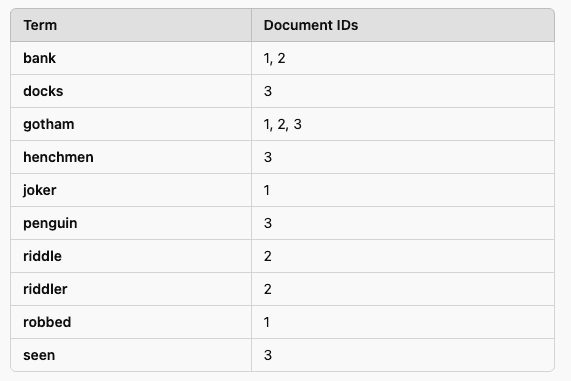The Dark Knight of Search: Apache Lucene Unmasked - Part 1

The Dark Knight of Search: Apache Lucene Unmasked - Part 1
In the depths of Gotham, a crime wave surges. Information is scattered, and only one hero can make sense of the chaos—Batman. But what if Batman had a digital counterpart? Meet Apache Lucene, the Dark Knight of search technology, designed to bring order to unstructured data. This first part of our series explores the foundational concepts of Lucene, illustrating its power through code examples and analogies.
Why Apache Lucene?
Just as Batman relies on his intellect and tools to analyze evidence, Lucene leverages powerful indexing and search capabilities to efficiently process massive amounts of text. It’s the robust engine powering search in applications like Elasticsearch and Solr, significantly impacting how we interact with information today.
How Lucene Works: The Batcomputer Analogy
Imagine Batman in the Batcave. His Batcomputer holds detailed records of every villain in Gotham. Instead of manually searching through every file, he queries "Joker AND heists," and the Batcomputer instantly returns relevant results. Apache Lucene performs similarly, swiftly retrieving relevant documents using an Inverted Index.
A Simple Lucene Search Example (Java)
Let's build a basic Lucene-powered search engine in Java:
import org.apache.lucene.analysis.standard.StandardAnalyzer;
import org.apache.lucene.document.*;
import org.apache.lucene.index.*;
import org.apache.lucene.queryparser.classic.QueryParser;
import org.apache.lucene.search.*;
import org.apache.lucene.store.RAMDirectory;
public class BatmanLucene {
public static void main(String[] args) throws Exception {
StandardAnalyzer analyzer = new StandardAnalyzer();
RAMDirectory index = new RAMDirectory();
IndexWriterConfig config = new IndexWriterConfig(analyzer);
IndexWriter writer = new IndexWriter(index, config);
addDoc(writer, "Joker plans a bank heist");
addDoc(writer, "Batman stops a robbery at Gotham Bank");
writer.close();
Query query = new QueryParser("content", analyzer).parse("Joker AND heist");
IndexSearcher searcher = new IndexSearcher(DirectoryReader.open(index));
TopDocs docs = searcher.search(query, 10);
for (ScoreDoc sd : docs.scoreDocs) {
Document d = searcher.doc(sd.doc);
System.out.println("Found: " + d.get("content"));
}
}
private static void addDoc(IndexWriter writer, String value) throws Exception {
Document doc = new Document();
doc.add(new TextField("content", value, Field.Store.YES));
writer.addDocument(doc);
}
}
This program indexes and searches "case files," demonstrating Lucene's core functionality.
The Detective's Notebook: Understanding Inverted Indexes
Imagine Batman's meticulously organized records. An inverted index is a data structure that mirrors this organization. Instead of sequentially searching documents, it maps words to the documents containing them, enabling incredibly fast lookups. This is fundamentally how Lucene achieves its speed and efficiency.
How an Inverted Index Works
A traditional database requires scanning each record. An inverted index reverses this, organizing words and mapping them to documents. This dramatically reduces search time.
Inverted Index Example
Consider these crime reports:
- The Joker robbed Gotham Bank.
- The Riddler left a riddle at Gotham Bank.
- Penguin’s henchmen were seen at Gotham Docks.
Lucene would create an inverted index similar to this:

Searching for "Gotham Bank" instantly returns documents 1 and 2.
Tokenization: Deciphering the Villain's Message
Before indexing, Lucene tokenizes text, breaking it into keywords. This process, similar to Batman deciphering codes, improves search accuracy. For example, "The Joker robbed Gotham Bank" becomes: `joker`, `robbed`, `gotham`, `bank`. Common words (stop words) like "the" are often ignored.
Stemming and Lemmatization: Recognizing Word Variations
Lucene uses stemming and lemmatization to group related words. Stemming reduces words to their root (e.g., "running" → "run"), while lemmatization converts words to their dictionary form (e.g., "better" → "good"). This ensures that searches for "robbed" also return results containing "robbery".
Indexing Documents (Java)
import org.apache.lucene.analysis.standard.StandardAnalyzer;
import org.apache.lucene.document.*;
import org.apache.lucene.index.*;
import org.apache.lucene.store.RAMDirectory;
public class BatcomputerIndex {
public static void main(String[] args) throws Exception {
RAMDirectory index = new RAMDirectory();
IndexWriterConfig config = new IndexWriterConfig(new StandardAnalyzer());
IndexWriter writer = new IndexWriter(index, config);
addDocument(writer, "The Joker robbed Gotham Bank.");
addDocument(writer, "The Riddler left a riddle at Gotham Bank.");
addDocument(writer, "Penguin’s henchmen were seen at Gotham Docks.");
writer.close();
System.out.println("Index built successfully. The Batcomputer is ready!");
}
private static void addDocument(IndexWriter writer, String content) throws Exception {
Document doc = new Document();
doc.add(new TextField("content", content, Field.Store.YES));
writer.addDocument(doc);
}
}
This code creates the inverted index, mapping words to documents for efficient searching.
Conclusion: The Batcomputer is Ready!
Apache Lucene, like the Batcomputer, empowers applications with incredibly fast and efficient search capabilities. By understanding the underlying principles of inverted indexes, tokenization, and stemming/lemmatization, developers can harness Lucene's power to build robust and responsive search solutions. In the next part, we'll delve into Lucene's query capabilities.
Related Articles
Software Development
Unveiling the Haiku License: A Fair Code Revolution
Dive into the innovative Haiku License, a game-changer in open-source licensing that balances open access with fair compensation for developers. Learn about its features, challenges, and potential to reshape the software development landscape. Explore now!
Read MoreSoftware Development
Leetcode - 1. Two Sum
Master LeetCode's Two Sum problem! Learn two efficient JavaScript solutions: the optimal hash map approach and a practical two-pointer technique. Improve your coding skills today!
Read MoreBusiness, Software Development
The Future of Digital Credentials in 2025: Trends, Challenges, and Opportunities
Digital credentials are transforming industries in 2025! Learn about blockchain's role, industry adoption trends, privacy enhancements, and the challenges and opportunities shaping this exciting field. Discover how AI and emerging technologies are revolutionizing identity verification and workforce management. Explore the future of digital credentials today!
Read MoreSoftware Development
Unlocking the Secrets of AWS Pricing: A Comprehensive Guide
Master AWS pricing with this comprehensive guide! Learn about various pricing models, key cost factors, and practical tips for optimizing your cloud spending. Unlock significant savings and efficiently manage your AWS infrastructure.
Read MoreSoftware Development
Exploring the GNU Verbatim Copying License
Dive into the GNU Verbatim Copying License (GVCL): Understand its strengths, weaknesses, and impact on open-source collaboration. Explore its unique approach to code integrity and its relevance in today's software development landscape. Learn more!
Read MoreSoftware Development
Unveiling the FSF Unlimited License: A Fairer Future for Open Source?
Explore the FSF Unlimited License: a groundbreaking open-source license designed to balance free software distribution with fair developer compensation. Learn about its origins, strengths, limitations, and real-world impact. Discover how it addresses the challenges of open-source sustainability and innovation.
Read MoreSoftware Development
Conquer JavaScript in 2025: A Comprehensive Learning Roadmap
Master JavaScript in 2025! This comprehensive roadmap guides you through fundamental concepts, modern frameworks like React, and essential tools. Level up your skills and build amazing web applications – start learning today!
Read MoreBusiness, Software Development
Building a Successful Online Gambling Website: A Comprehensive Guide
Learn how to build a successful online gambling website. This comprehensive guide covers key considerations, technical steps, essential tools, and best practices for creating a secure and engaging platform. Start building your online gambling empire today!
Read MoreAI, Software Development
Generate Images with Google's Gemini API: A Node.js Application
Learn how to build an AI-powered image generator using Google's Gemini API and Node.js. This comprehensive guide covers setup, API integration, and best practices for creating a robust image generation service. Start building today!
Read MoreSoftware Development
Discover Ocak.co: Your Premier Online Forum
Explore Ocak.co, a vibrant online forum connecting people through shared interests. Engage in discussions, share ideas, and find answers. Join the conversation today!
Read MoreSoftware Development
Mastering URL Functions in Presto/Athena
Unlock the power of Presto/Athena's URL functions! Learn how to extract hostnames, parameters, paths, and more from URLs for efficient data analysis. Master these essential functions for web data processing today!
Read MoreSoftware Development
Introducing URL Opener: Open Multiple URLs Simultaneously
Tired of opening multiple URLs one by one? URL Opener lets you open dozens of links simultaneously with one click. Boost your productivity for SEO, web development, research, and more! Try it now!
Read More
Software Development, Business
Unlocking the Power of AWS: A Deep Dive into Amazon Web Services
Dive deep into Amazon Web Services (AWS)! This comprehensive guide explores key features, benefits, and use cases, empowering businesses of all sizes to leverage cloud computing effectively. Learn about scalability, cost-effectiveness, and global infrastructure. Start your AWS journey today!
Read MoreSoftware Development
Understanding DNS in Kubernetes with CoreDNS
Master CoreDNS in Kubernetes: This guide unravels the complexities of CoreDNS, Kubernetes's default DNS server, covering configuration, troubleshooting, and optimization for seamless cluster performance. Learn best practices and avoid common pitfalls!
Read MoreSoftware Development
EUPL 1.1: A Comprehensive Guide to Fair Open Source Licensing
Dive into the EUPL 1.1 open-source license: understand its strengths, challenges, and real-world applications for fair code. Learn how it balances freedom and developer protection. Explore now!
Read MoreSoftware Development
Erlang Public License 1.1: Open Source Protection Deep Dive
Dive deep into the Erlang Public License 1.1 (EPL 1.1), a crucial open-source license balancing collaboration and contributor protection. Learn about its strengths, challenges, and implications for developers and legal teams.
Read MoreSoftware Development
Unlocking Kerala's IT Job Market: Your Path to Data Science Success
Launch your data science career in Kerala's booming IT sector! Learn the in-demand skills to land high-paying jobs. Discover top data science courses & career paths. Enroll today!
Read More
Software Development
Automation in Software Testing: A Productivity Booster
Supercharge your software testing with automation! Learn how to boost productivity, efficiency, and accuracy using automation tools and best practices. Discover real-world examples and get started today!
Read MoreSoftware Development
Mastering Anagram Grouping in JavaScript
Master efficient anagram grouping in JavaScript! Learn two proven methods: sorting and character counting. Optimize your code for speed and explore key JavaScript concepts like charCodeAt(). Improve your algorithms today!
Read More
Software Development
Mastering Kubernetes Deployments: Rolling Updates and Scaling
Master Kubernetes Deployments for seamless updates & scaling. Learn rolling updates, autoscaling, and best practices for high availability and efficient resource use. Improve your application management today!
Read More